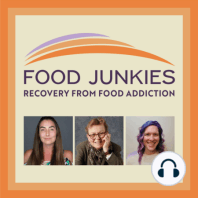50 min listen
Episode 26: Dr. Joan Ifland
ratings:
Length:
62 minutes
Released:
Jun 22, 2021
Format:
Podcast episode
Description
In Today’s episode, Clarissa and Molly speak with Dr. Joan Ifland. Joan Ifland is a researcher and educator in the field of food addiction and allergies. She was the founder in 1996 of The Sugars and Flours Project of Houston which provides education about food reactions. In 2007, she founded the Refined Food Addiction (ReFA) Research Foundation which is dedicated to facilitating the flow of information between clinicians and researchers. She is the lead author of the first academically published description of food addiction in humans. She is a co-founder of the Society of Food Addiction Professionals. Dr. Ifland's approach to recovery from stubborn diet-related diseases is clear: address food addiction as the driver of over-consumption of harmful processed foods Since 1996, Dr. Ifland has helped people recover from diet-related diseases by focusing on addiction to processed foods. Through the adaptation of drug and alcohol addiction recovery methods, Dr. Ifland gives practitioners and clients new insights into why food addiction recovery can generate extraordinary health outcomes. In this episode: Dr. Ifland discusses what inspired her to write the textbook, Processed Food Addiction: Foundations, Assessment, and Recovery She makes it clear that she is NOT a clinician, she is a researcher and peer-support specialist. The Addiction Reset Community (ARC) is a peer support community and relies on Mirror Neurons to be effective. She also cautions, the ARC is NOT a stand-alone answer How Big Food uses our biological wiring against us with the 5 A’s: Advertising, Availability, Affordability, Addictive substances in the product, Age of Onset taken from Big Tobacco We talk about the research around fasting and how you can get addicted to the starvation “high” What she would say to the eating disorder professionals who do not believe in Processed Food Addiction How she guides people through volume eating What she suggests for people to be able to live their lives surrounded by marketing aimed at keeping us thinking about processed food Her upcoming research in a hospital setting Safe weight management and how she NEVER celebrates weight-loss What can be done to have the APA and WHO consider Food Addiction as a diagnosis What research is still needed How she answers our signature question Follow Dr. Ifland: Book: Processed Food Addiction: Foundations, Assessment, and Recovery Website: Processedfoodaddiction.com Facebook: https://www.facebook.com/joan.ifland.1 Instagram: https://www.instagram.com/foodaddictionreset/ Twitter: https://twitter.com/pfaddiction The content of our show is educational only. It does not supplement or supersede the professional relationship and direction of your healthcare provider. Always seek the advice of your physician or other qualified mental health providers with any questions you may have regarding a medical condition, substance use disorder, or mental health concern.
Released:
Jun 22, 2021
Format:
Podcast episode
Titles in the series (100)
Episode 21 Dr. Evelyne Bourdua-Roy: Clinique Reversa by Food Junkies Podcast
